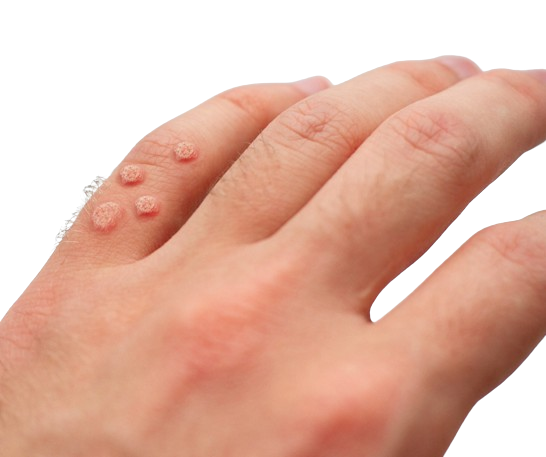Warts Expert in Perumbakkam
Your Trusted Partner in Warts
Warts are a type of skin infection caused by the human papillomavirus (HPV). The infection causes rough, skin-colored bumps to form on the skin.We are here to provide you with top-notch care and guidance to tackle your problems.

Understanding Warts
What are Warts?
Warts are noncancerous (benign) rough bumps that form on the skin. They develop when the human papillomavirus or HPV, enters a cut or break in the skin and causes an infection.
What are the types of Warts?
Wart types vary depending on the affected body part. Types include:
- Hands: These warts are called common warts because they are the most common type.
- Face: Flat warts affect the face and forehead.
- Feet: plantar warts appear on the soles of the feet. These warts look like calluses with tiny black dots in the center. They are often painful and form in clusters.
- Genitals: Warts that form on the penis, vagina or rectum are called genital warts. These warts are a type of sexually transmitted infection. You get genital warts through sexual contact with an infected person.
- Periungual and subungual: These warts form under or around fingernails and toenails.
What causes Warts and are they Contagious?
When the human papillomavirus (HPV) enters a cut in the skin, it causes a skin infection that forms warts. Warts are very contagious. The virus can spread from person to person or from different parts of the body through:
- Direct contact with a wart.
- Touching something contaminated with the virus, such as towels, doorknobs and shower floors.
- Sexual intercourse (genital warts).
- Nail biting and cuticle picking.
- Shaving.
What are the symptoms of Warts?
Warts vary in appearance. They may look:
- Dome-shaped.
- Flat.
- Rough.
- Skin-colored, brown, grey or black
How are Warts managed or treated?
Warts often go away on their own after your immune system fights off the virus. Because warts can spread, cause pain and be unsightly, your doctor may recommend treatment. Options include:
- At-home wart removal: Over-the-counter (OTC) wart removal medications, such as Compound W®, contain salicylic acid. This chemical dissolves warts one layer at a time. These products come in liquid, gel and patch form. You may need to apply the medication every day for several months to get rid of the wart completely.
- Freezing: During a procedure called cryotherapy, your doctor applies liquid nitrogen to freeze the wart. After freezing, a blister forms. Eventually, the blister and wart peel off. You may need several treatments.
- Immunotherapy: For stubborn warts that don’t respond to traditional treatments, immunotherapy helps your immune system fight the virus. This process involves a topical chemical, such as diphencyprone (DCP). DCP causes a mild allergic reaction that makes the wart go away.
- Laser treatment: Your doctor uses laser light to heat and destroy tiny blood vessels inside the wart. The process cuts off blood supply, killing the wart.
- Topical medicine: Your doctor may apply a liquid mixture containing the chemical cantharidin. A blister forms under the wart and cuts off its blood supply. You must return to your doctor’s office in about a week to have the dead wart removed.
What are the complications of Warts?
Most warts go away without any significant problems. Sometimes warts cause issues, such as:
- Cancer: HPV and genital warts are linked to several different cancers, including anal cancer, cervical cancer and throat cancer You can lower your risk of genital warts by getting the HPV vaccine and using condoms.
- Disfigurement: People with weakened immune systems may develop unappealing clusters of warts on the hands, face and body.
- Infection: Infections can occur if you pick or cut a wart. Breaks in the skin allow bacteria to enter.
- Pain: Most warts don’t hurt. But plantar warts can grow inward into the foot and be painful to walk on. You may feel as if there’s a pebble under the skin.
How can I prevent Warts?
There’s really no way to prevent warts. However, you can lower your risk of picking up the virus or stop warts from spreading by taking these steps:
- Avoid shaving over a wart.
- Break the habit of biting your nails or picking at cuticles.
- Don’t share towels, washcloths, clothing, nail clippers, razors or other personal items.
- Don’t touch another person’s wart.
- Get the HPV vaccine and use condoms to prevent genital warts.
- Keep your feet dry to prevent the spread of plantar warts.
- Try not to scratch, cut or pick at a wart.
- Wear flip-flops or shoes when using a public locker room, pool area or showers.
When should I call my healthcare provider about Warts?
You should call your provider if the wart:
- Breaks open often, increasing the risk of infection or virus spread.
- Causes embarrassment.
- Develops on the genitals or rectum (genital warts).
- Itches.
- Looks infected (red or pus-filled).
- Makes walking painful and difficult (plantar warts).
Frequently Asked Question on Warts
Genital warts are primarily spread through sexual contact, but in rare cases, non-sexual transmission can occur. It’s important to practice safe sex and seek medical advice if you notice any unusual growths in the genital area.
